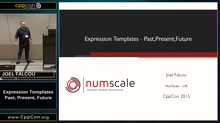CppCon 2015 C++ for cross-platform VR--Nicolas Lazareff
 Have you registered for CppCon 2016 in September? Don’t delay – Early Bird registration is open now.
Have you registered for CppCon 2016 in September? Don’t delay – Early Bird registration is open now.
While we wait for this year’s event, we’re featuring videos of some of the 100+ talks from CppCon 2015 for you to enjoy. Here is today’s feature:
C++ for cross-platform VR
by Nicolas Lazareff
Summary of the talk:
This talk is an overview of how C++ can be used to quickly create cross-platform virtual reality experiences while sharing one codebase.
To support all major vendors, a VR experience has to span not only across operating systems, but also device types, hardware specs, manufacturers, and SDKs -- and so pitfalls and learnings from shipping on Oculus mobile and desktop, Google Cardboard, and soon Sony's Morpheus will be discussed.
We'll cover networking, graphics, SDK wrappers, and even abstracting language oddities (Android's Java layer for Oculus mobile).

 Have you registered for CppCon 2016 in September? Don’t delay –
Have you registered for CppCon 2016 in September? Don’t delay –  Have you registered for CppCon 2016 in September? Don’t delay –
Have you registered for CppCon 2016 in September? Don’t delay –  Have you registered for CppCon 2016 in September? Don’t delay –
Have you registered for CppCon 2016 in September? Don’t delay –  Have you registered for CppCon 2016 in September? Don’t delay – Early Bird registration is open now.
Have you registered for CppCon 2016 in September? Don’t delay – Early Bird registration is open now. Have you registered for CppCon 2016 in September? Don’t delay –
Have you registered for CppCon 2016 in September? Don’t delay – 
 Have you registered for CppCon 2016 in September? Don’t delay –
Have you registered for CppCon 2016 in September? Don’t delay –